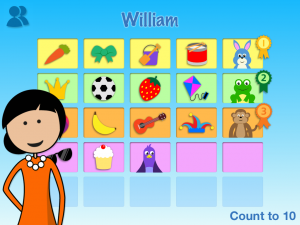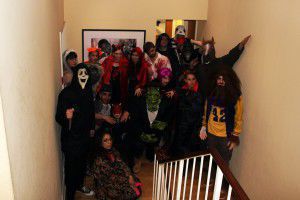EuroTalk: a look back at 2013
It’s been another busy year at EuroTalk, with new products, new languages… and a new puppy. Throw in a royal encounter and a cake that looks like a Dalek, and you’ve got the makings of an interesting twelve months.
Languages
In June, we launched our new app for iPhone and iPod touch, uTalk. This had been in development for a long time, and we were really proud and excited to be able to share it with the world. It’s got more content and more activities, and it’s free to download and start learning the essential words you need to get by in 60 languages. We’ve been adding more languages regularly since the app was launched, and will continue to do so over the coming months. So if we haven’t yet got the language you need, don’t worry – we soon will.
And that’s not all. Last month, we added Lao, the official language of Laos and also spoken in the north east of Thailand, to our range with the release of Talk Now, our beginner program for PC and Mac. Lao has about 15 million speakers worldwide, and is a language we’ve been wanting to offer for some time now. There are more new languages on the way in 2014, so watch this space…
Maths
This year also saw the launch of part 2 of our second maths app, Maths, age 4-6, and two new practice apps – Count to 10 and Count to 20. We also released a version of Maths age 3-5, for schools, so teachers can use the app in the classroom.
Malawi
We’ve been working in Malawi now for several years, as part of our mission to ensure one billion primary age children reach their full potential in numeracy, reading and English. This year, Dr Nicola Pitchford from the University of Nottingham conducted an evaluation at Biwi Primary School in Malawi, to measure how effective our maths apps are for the children’s learning, compared to other teaching methods, including other apps. The preliminary results show that not only did the group using our apps perform significantly better than the other groups, but in fact they tripled their maths knowledge in just eight weeks. This is really exciting and encouraging, and we hope now to scale up the project in Malawi to reach more children, in more schools.
Junior Language Challenge
2013 saw the return of the JLC, after a year off in 2012. Our annual language learning competition for primary age children across the UK is always very popular, and this year was no exception. We were joined at the final by Martha Payne of NeverSeconds, who at just 10 years old, has raised over £140,000 for Mary’s Meals, a charity providing school dinners to children in Malawi. Martha, with her dad and her sister, was our special guest and handed out the prizes to our finalists, including the JLC Champion for 2013, Ella Whittingham from West Bridgford, Nottingham.

Martha Payne with JLC Champion Ella Whittingham, runners-up Morgan Fry and Tudor Mendel-Idowu, and EuroTalk Chairman Richard Howeson
A Royal Visit
In October, Steve was honoured by a visit from Her Royal Highness Princess Maha Chakri Sirindhorn of Thailand, while at an exhibition in Bangkok. The Princess came to have a look at the EuroTalk stand, and later Steve presented her with a gift on behalf of the company. He had to be instructed on the correct way to bow, and fortunately he got it right!
New arrivals
This year, we’ve said a sad goodbye to Glyn, Tom and Hanna, but welcomed Safia, Seb and Pablo. We’ve also been lucky to have Lorena with us from Germany for a few months; you may have enjoyed some of her blog posts! And in August we welcomed Molly the puppy, who caused a certain amount of mayhem, but was very easily forgiven because she’s so cute.
Fancy dress fun
We entered into the ‘spirit’ of Halloween by getting dressed up for the occasion. With everything from vampires to skeletons, pumpkins to werewolves, we were quite a sight to behold. Although some of us were scarier than others…
Lots of cake
We’ve always enjoyed a bit of cake here at EuroTalk, but this year we’ve been thoroughly spoilt, with keen bakers Safia and Alex (but mostly Safia) providing us with masterpieces like this amazing Dalek cake. (It took us three days to eat, but it was totally worth it.)
And so the year has come to an end in style. Thanks as always for reading our blog, and to our guest bloggers who’ve been in touch over the last year. Please do contact us if you have something you’d like to share!
Happy New Year, everyone – see you in 2014!
100 words for snow…?
It’s a commonly stated ‘fact’ that Eskimos have lots of different words for snow. Some accounts say nine; others 48; others still say 100! Language isn’t usually that easy to pin down though – ‘Eskimo’ actually covers lots of different groups of people and if we’re getting philosophical, what do we mean by ‘word’? It’s probably fair to say though, that people do have lots of words for the things that affect them the most…
218 for Rain
Weather inspires lots of new words. Some people have counted 218 words for rain, fog and mist in the Scots language! But the Hawaiians are also rain-obsessed – there are 139 words for rain, including some really specific ones like ‘nahua’ for the ‘fine rain that accompanies the north-east trade winds along the northern part of Maui’.
4 for Love
Greek offers four different words for love that range from ‘philia’ (φιλία), which means ‘friendship’ in modern Greek, to ‘agapē’ (αγάπη), which means ‘love’ in the sense of ‘I love you’. Some might say that’s a very sensible distinction to make!
46 for Camels
Animals are important too. There are about 46 Somali words for camels in various stages of the reproductive cycle, but then this pales into insignificance when you consider that there are around 500 breeds of dog referred to in the English language!
Lots for Drunkenness
And of course, the British have hundreds of slang terms for being drunk, including ‘sozzled’, ‘pickled’ and ‘wellied’, as well as lots of other bizarre words that were almost certainly dreamed up under the influence of alcohol themselves…
And that’s not all…
If we think about it, there are actually lots of examples in English for this – for many words it would be quite easy to come up with at least a handful of others that mean something very similar.
Take ‘angry’, for example; you could be miffed, frustrated, annoyed, furious or even incandescent. All these words express a slightly different degree of the same emotion, and this is just a selection. That’s the great thing about language – there’s a word for (almost) everything!
Can you think of any more examples from your language?
Languages for the future: the top ten
A recent report by the British Council has laid out the ten most important languages for the UK’s future, in political, economic, educational and cultural terms.
According to the report, the ten most important languages, in order, are: Spanish, Arabic, French, Mandarin, German, Portuguese, Italian, Russian, Turkish and Japanese. I read this list with a certain amount of smugness that I speak Spanish, German and French – although my knowledge of key languages such as Mandarin and Arabic is, sadly, next to nothing. So feel free to give yourself a pat on the back if you can speak, or are learning, one of those ten languages.
 Unfortunately, the report also indicated that the numbers of UK residents actually learning these languages, especially the ones not taught in schools, are very low. On a positive note, around 15% of people can hold a conversation in French. However, only 6% are able to do so in German, 4% in Spanish and 2% in Italian. But the figures for the other languages are as low as 1%.
Unfortunately, the report also indicated that the numbers of UK residents actually learning these languages, especially the ones not taught in schools, are very low. On a positive note, around 15% of people can hold a conversation in French. However, only 6% are able to do so in German, 4% in Spanish and 2% in Italian. But the figures for the other languages are as low as 1%.
Perhaps one of the problems is that Mandarin, Japanese, Russian and Arabic all require learners to pick up another script. This might seem daunting, but is actually really exciting. Just being able to read simple words in another script gives you a huge sense of achievement, and you’d be surprised how quickly you can begin to decipher words from what previously looked like squiggles.
Hopefully if you’re reading our blog you already know the importance of language-learning, and that picking up a new language is an adventure rather than a chore! But maybe this list will give you an idea about which language you fancy picking up – maybe it’s time to start reviving your A-level French? Or be brave and give Arabic a try? Personally, I’m working on adding Italian to my list, which is proving interesting as I lapse back into Spanish as soon as I don’t know a word!
The report recommends a much greater focus on languages in schools and that businesses should invest in language training for languages that are useful in their industry. But don’t worry if your school days are behind you – it’s never too late to learn a new language!
Alex
Want to learn a language? Go to the pub*
The blog article about ‘Learning a language – our top 10 tips’ is so true! Now I have been in London for more than three months and you have to take all the tips to your heart. For example, ‘Don’t be scared to talk to people’ and ‘Find someone to talk to’ are very important points. And I found a good solution. Near to my house is a pub. And over time the publican and me, we have become good friends. He is a very friendly man and his daughter helps in the pub too. A happy family business! Every time I pass the pub, he waves at me. This makes me happy and I feel like I’ve arrived in this new city.
 I remember, the first time I was in the pub, because the internet in my homestay didn’t work. I thought, the pub will definitely have wi-fi! And I was right. I ordered a Coke and sat there with my laptop. The publican was curious about what I am doing in London and why I am here. I can imagine, suddenly there is a person from another country, speaking another language. Thus the first step was done. Whenever I didn’t know what to do with my evening, I would go to the pub. One day I was even allowed to use his kitchen for muffins! My host mother had a birthday and I thought it could be nice to make some for her. In the end I did 24 because the publican said, why didn’t I use all my ingredients.
I remember, the first time I was in the pub, because the internet in my homestay didn’t work. I thought, the pub will definitely have wi-fi! And I was right. I ordered a Coke and sat there with my laptop. The publican was curious about what I am doing in London and why I am here. I can imagine, suddenly there is a person from another country, speaking another language. Thus the first step was done. Whenever I didn’t know what to do with my evening, I would go to the pub. One day I was even allowed to use his kitchen for muffins! My host mother had a birthday and I thought it could be nice to make some for her. In the end I did 24 because the publican said, why didn’t I use all my ingredients.
So don’t be scared to go in a pub and if someone wants to speak with you, don’t panic. They are interested and they can help you to improve your English. Ask if you don’t understand something, and they will explain it to you. Believe me, it makes you happy, if you understand the meaning! So what do we learn from this? Always go in pubs!
And as point 10 said: ‘Enjoy it’! This the main thing. You want to learn a new language for you and you don’t have to prove anything to anybody. It is for you alone. If you are happy with the things that you are doing, you learn faster and more. I talk a lot with my host mother and love it. Every evening we have dinner together, we talk about her and my day. To live in a host family is also a good solution because when you arrive, you aren’t alone. Or like me, start an internship in this country! You have people around you and everything you are doing has to do with the language you want to learn. You take part in a working life. And before I take the train to come home, I take the London Evening Standard and read it in the train. Any social things you find, use them! Or what about a book? Start with one you know you will understand and later you can buy a book with a higher reading level.
Lorena
* Or a cafe. Or a restaurant. They work too.
Being bilingual: practice makes perfect
Last week’s post, which contained our top ten tips for learning a language, inspired a few members of the EuroTalk team to share their own thoughts. Here’s what Seb had to say about his experience of learning Spanish, after leaving Colombia and coming to England when he was very young. And come back tomorrow to find out why Lorena recommends spending as much time as possible in the pub. We’d love to hear from anyone else who’d like to share their own advice. Please do send us an email to liz@eurotalk.com if you’d like to contribute to the blog!
My parents emigrated to the UK from Colombia when I was very young and at the time the only language I could speak was Spanish. However, once I began my schooling in London I picked English up very easily. Well, I like to think so anyway because it was so long ago to the point where I cannot even remember a stage in my life where I could not speak both English and Spanish. Attending school and being around English speakers every day meant that very quickly my English overtook my Spanish in terms of the range of words I could use.
 If this kept up I would have definitely forgotten how to speak Spanish. However, my parents made sure that my younger sister and myself always spoke in Spanish once we stepped into our house, because they knew that we would be immersed in the English language for the large majority of the day – from being at school to the shows we watched on television. Therefore, if we were in the house we had to speak in Spanish. I think this was my parents’ way of making sure that we didn’t forget our roots and at the same time they knew it would be beneficial for us in the future to be able to speak two languages, even though we may not have seen it back then.
If this kept up I would have definitely forgotten how to speak Spanish. However, my parents made sure that my younger sister and myself always spoke in Spanish once we stepped into our house, because they knew that we would be immersed in the English language for the large majority of the day – from being at school to the shows we watched on television. Therefore, if we were in the house we had to speak in Spanish. I think this was my parents’ way of making sure that we didn’t forget our roots and at the same time they knew it would be beneficial for us in the future to be able to speak two languages, even though we may not have seen it back then.
This very quickly became routine and I would find it normal to speak Spanish at home and English when I was out, which fascinated some of my friends. Having been brought up in this way helped me greatly because it meant that I was able to learn English as well as Spanish simultaneously. It also helped me more in terms of my pronunciation and speaking, meaning that my Spanish is fluent enough for me to easily have a conversation, even though it is still not perfect.
Despite this, I believe that the only reason I am able to speak Spanish fluently at this age is because I had to speak it on a daily basis, and you know what they say, ‘practice makes perfect’. Therefore, I think that if you are attempting to learn a new language it is very important to immerse yourself in that language on a daily basis, so that you become accustomed to not only speaking it but also hearing it.
Seb








